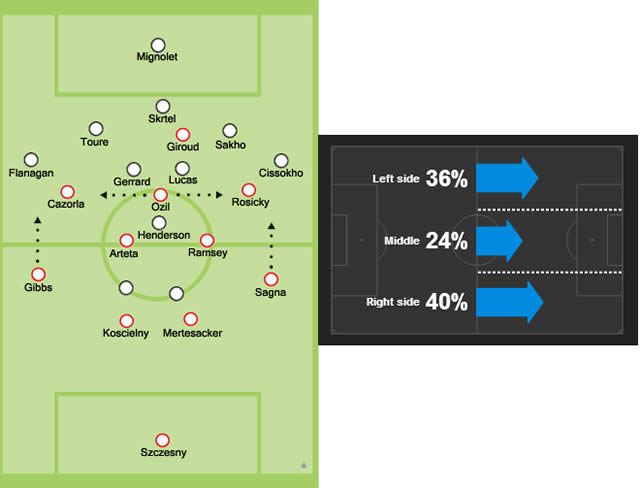There were a number of times in the first-half when Mesut Ozil threw his hands up in the air and gave a look of displeasure (or was it something else? It’s hard to tell with the German) whenever his teammates didn’t return the ball his way. The reason for his exasperation was that Arsenal were moving the ball so fast that passes had to stick, and if they did, The Gunners threatened to defeat Liverpool by more than the 2-0 scoreline.
Ozil was central to Arsenal’s play and he typified their give-and-go style. At times, it was to their detriment as they tried so hard to score the perfect goal, rarely looking to play a player in behind. For the most part, however, it was intoxicating. Passes bumped off from feet to feet like a puck rebounding between hockey sticks, the ball moving side to side at breakneck speed. After the game, Ozil tweeted: “That was football in Formula 1 speed. It’s wonderful to be a Gunner.”
Of course this is the way Arsenal have played all season: swift, accurate passes trying to create the optimal chance. Yet, they’ve probably not played at such a sustained level in the full ninety-minutes apart from the 2-0 win over Napoli. On the one hand, that was allowed by the discipline of Mikel Arteta who was always alert to mop up any danger in front of the back four, and the tenacity shown by the Arsenal defence whenever Luis Suarez received the ball.
In that regard, Arsenal were far better guarded on transitions than they were in the other two recent “tests” against Chelsea and Borussia Dortmund. On the other hand, Liverpool’s tactics played perfectly to Arsenal’s strengths, allowing them to dominate the game from start to finish.
Brendan Rodgers chose to play a 3-5-2, a system he finds gets the best use out of Daniel Sturridge and Luis Suarez without ceding the midfield area. It’s true that they matched Arsenal in the centre but the problem with the system against a 4-2-3-1 is that it’s always facing a 2 v 1 on the wings. Johan Cruyff once scorned the use of 3-5-2s because it turns wing-backs into “athletes” and indeed, that highlights the best way to use the system is on the counter-attack.
Brendan Rodgers’s problem was that he tried to match Arsenal for possession (while last season, he played Luis Suarez on the left-flank to use his pace on the break) so while they had enough bodies to compete with Arsenal in the centre, it became over-crowded to play a passing game. Therefore, the out-ball was to play it wide, to one of the wing-backs, but because Arsenal always had an advantage, it was difficult to recycle the ball properly. Instead, too often, Liverpool had to rely on one of the strikers to move out to pick up the ball and moves were easier to break down.
The problem extended to when Liverpool didn’t have the ball. Arsenal are often accused of playing too many sideways passes, but against Liverpool’s 3-5-2, it was too easy to play many sideways passes. That’s because the 3-5-2 has only one line of width. It’s okay when Liverpool are pushed back and can defend the space laterally with five at the back, but the problem arises, as it did here, when they try to play proactively and Arsenal have room to shift it left and right easily. (It was essentially eight against seven in Arsenal’s favour across the pitch). Crystal Palace, who defended deep with a 4-5-1, were able to cope far better, despite the lack of individual quality, because they were always able to double up and “stick with the one-twos” as Gary Neville alluded was crucial when facing Arsenal.

At half-time, Rodgers changed to a 4-4-2 but that really didn’t address the problems Liverpool had in sticking with Arsenal’s runners, and in any case, a man light in midfield.
Of Arsenal’s three big tests recently, this was probably Arsenal’s easiest. Collectively, all eleven players stepped-up and the team defended on the front-foot. The pressing and marking was tireless, and although the team started to lose their shape a bit early in the second-half, Arsene Wenger’s energy on the touchline ensured his side kept their discipline.
Going forward, Arsenal are still heavily reliant on Ozil. He seemingly had one of his quieter games but he constantly moved around the pitch with elegance and instigated Arsenal’s good start before Rosicky and Cazorla grew more dominant. However, Arsenal’s unwavering desire to play a one-touch game around Giroud can be a weakness as well as their strength, particularly when they shut out all other avenues of creating chances and continually look for the perfect goal. Perhaps as it did against Chelsea in the League Cup, it could have been to Arsenal’s detriment, but with Mesut Ozil urging the team on, it never really looked likely.
In any case, there’s always Aaron Ramsey on hand to bail them out with yet another stunning goal.


